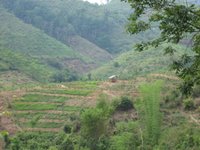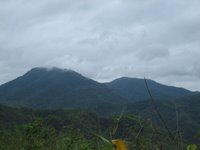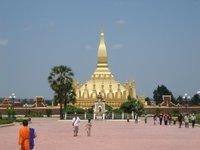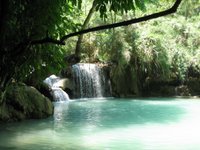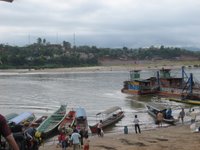Things that I've been tempted to start this post with:
"Gooooooooooooood morning Vietnaaaaaaaaaaam"
"I love the smell of napalm in the morning, and banana pancakes..."
"...so back in 'Nam..."
Instead, I'll simply start with "Hello everyone, I'm in Vietnam now." Not as interesting, but sure is informative!
Since I'm sick and tired of describing my times on buses (much as i'm sick and tired of being on busses) I will merely relate the statistics affiliated with my travel between the capitol city of Vientiane in Laos and the capitol city of Hanoi in Vietnam.
Time bus scheduled to leave: 7PM
Time bus scheduled to arrive: 7PM
For those not keeping track: That's 24 hours on a bus
Time that I had two seats to myself until: 7:28pm
Time bus actually departed: 7:29pm
Time bus arrived at border: 4AM
Time border opens: 7AM
Amount of time spent wondering why we just didn't leave at 10PM: Lots
Time spent sleeping on a loading dock near border and getting left behind by bus: 2 hours Amount of time to get through Laos border, walk to Vietnam border, get passport stamped and pay the special 'foreigner weekend fee": 2 hours
Size of woman sitting next to me on bus: Quite large
Temperature outside of bus: Warm
Temperature inside of bus: Broiler
Length of time A/C worked: 8.3 minutes
Amount of phyiscal contact that is preferable in these conditions: None, just none
Amount of physical contact I was forced to endure due to womans size: Extensive
Size of seat, and amount of leg room: tiny, negative (respectively)
Number of beers that I drank when I finally arrived in Hanoi: Around 10
Hangover: Awful
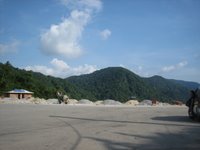
First view of Vietnam, just over the Laos border
And that's all that I'll say about it. It was miserable, I survived and I got where I needed to be. Can't ask much for for 12 dollars. Well, you can, but you won't get it.

Boy, that was a fun 23 hours
Vietnam is amazing. The blatant and in-your-face communism, the colors and the speed, the motos (mopeds) of which there are said to be some 5 million, the tragic history and the unbelievable pace of development, particularly in the toursim industry, it's all so different from where I'd been that for the first day, I just wandered around in a daze trying to take it all in. This actually was not such a bright thing to do, as crossing a street in Vietnam requires the prescience of Nostradamus and the agility of Batman and Catwoman's adolescent gymnast daughter. What I'm saying is that you need your wits about you.

Yay! Communism!
During my more than 7 days in Hanoi (non-consecutive, explained in top parenthetical), I spent most of my time in the "Old quarter" and around Huan Kiem Lake, which was South-East of that area. The Old Quarter of Hanoi is what you would get if a group of people thought to themselves "hey, we'll never need more than two horses to pass each other at one time right? Okay great, lets make all the streets 6 feet wide, have sidewalks just wide enough for our tiny feet and lets have those streets have the appearance of a grid, but really meander aimlessly back and forth so that anyone not familiar with it gets hopelessly lost within 10 seconds." I'm not sure if this conversation actually happened at a city council level, or if they just let a child draw with a piece of charcoal and went with that. Either way, it's a cramped, tree-overhung, loud, wonderful area and you could easily spend much longer there than I did
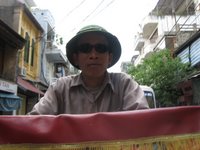
My cyclo driver. His name was Hank. Those are my sunglasses he's wearing
What is particularly unique about the Old Quarter is that if you take a moment to collate the overload of sensory input, you notice that each street has its own unofficial trade that everyone on the street is engaged in. For example: you may be walking along and realize that on either side of you, everyone is fixing motos (which, by the way, seems to be a national past-time, there are so many that everyone has one, and everyone knows how to fix them). There is banging and yelling and brilliant blinding blue sparks shooting up from welders torches and happy little red and gold firecracker colors exploding from grinding wheels. As you walk further, you realize that there seems to be no end to the noise, so you turn right. Ahh better! It's quieter and you can hear yourself think. Then (if you're me) you get excited, because this is the toy street.
Yes, thats right, a toy street.
This is a street on which every stall, store and child on a bike is selling plastic dolls, big wheels, Legos, strange anonymous looking robot things that come as part of a set of 8 million complementary parts and a 4,000 year old backstory. It's a veritable profusion of playthings and I spent a great deal of time there. There are also stationary streets, pants promenades, tank top tunnels, ball game boulevards, and underwear alleys. At each corner, there are the small plastic stool and table combinations (always blue or red) on which sit dozens of people around steaming bowls of pho (noodle soup) with everything from chicken to dog inside of it (yes, Vietnamese people eat dog, and it is not like a "once in a while" kind of thing). This is a city as vibrant as any I've ever been in, and I was never far from someone hawking icecream and noodles and photocopies of popular books and wanting to change my money and take me on moto and cyclo rides and just speak English with me.
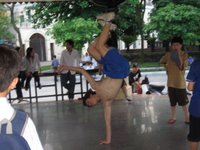
These kids were real dissapointed that I can't break dance. I promised them that I'd learn and come back to teach them my hip-happenin' moves. They looked puzzled and left
Of course, Vietnam is not all about fun and games, it's also about learning something (i.e. being subjected to ridiculous propaganda) and Hanoi provided a number of such activities. Most striking were a visit to the former "Hanoi Hilton" and to Ho Chi Minh's mauseoleum.
The Hanoi Hilton gained infamy during the Vietnam war for being one of the most brutal POW camps in recent world history. Going in, I didn't exactly expect to find a bastion of impartiality. Nor did I particualrly expect to be bowled over by their honesty at the treatment that American prisoners of war received at the hands of their captors. My lack-of-expectations were not exceeded.
Hoa Lo prison (its formal name) was originally built by the French, back when they did all of South-East Asia a big favor by colonizing it.
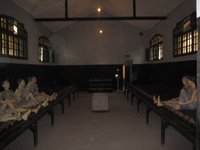
Weren't the French nice?
By no means was this prison anything other than awful, as the French used it largely to perfect newer and more terrible forms of torture, coerce confessions and ultimately to make sure that their guillotine never was lacking for company (sound familiar to anywhere else in the world...Iraq....). As such, while wandering through, a visitor is witness to any number of awful photographs, recounting of statistics and full sized mannequins chained to walls who have painted blood dripping from their chafed feet. Quite a sight. Still, as I walked around, I couldn't help but continue to glance up above me, waiting for that enormous, god-sized "other shoe" to drop.
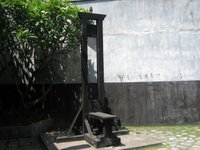
Have you ever been around a guillotine up close? The thing still had blood stains. Not too pleasant
And drop it did. It fell upon me like some great winged boot of irony cast down from up on high, right from the very top of Mt. Revisionist History. The "American Pilots" section of the museum occupied two rooms, two rooms stuffed full of the accountrements of American POW's lives in the camp. Most prominently displayed were Senator John McCain's entire flight suit, survival kit and even pieces of his plane. This exhibit thrust out into the center of one of the rooms, so that it was literally impossible to miss it, and it's implied message: "Even the mighty fall, we, in our benevolence had one of your people who is now a US Senator and we released him back to you safe and sound. Aren't we powerful? Aren't we kind?"
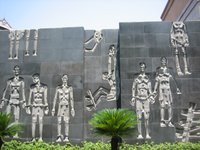
Not exactly a bright cheery smiley face
Aren't we full of s*#!?
I feel that it is worth reproducing, in its entirety, the sign that was posted outside of these particular exhibits. The picture is a bit tough to read.
"From August 5, 1963 to January 24, 1973, US Government carried out two destruction wars by Air and Navy against North Vietnam. The Nothern Army and people had brought down thousands of aircrafts, captured hundreds of American pilots. Part of these pilots were detained in Hoa Lo prison by our Ministry of Interior. Though having committed untold crimes on our people, but American pilots suffered no revenge once they were captured and detained. Instead, they were well treated with adequate food, clothing and shelter according to the provisions of Paris Agreement, our government had in March 1973, returned all captured pilots to the US Government. Pictures in this exhibition room show how American pilots had their life in Hoa Lo Prison (whole quote sic)."
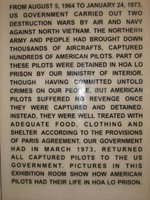
To give the benefit of the doubt, maybe whoever translated this just put a really biased view on it. So it's the translators fault. Uhh huhhh...
Riiiiiiiiiiiiiiight...the pictures all over the rooms portrayed the pilots playing ping-pong, cooking fresh food, writing in journals and, in one picture that was horrifying in its out-of-placeness, a group of five pilots apparently laughing uproariously at something that a Vietnamese soldier had said. The soldier has his rifle pointed vaguely in the direction of the pilots, and the boots of several more people can be seen around the periphery of the picture.
It is of course the perogative of a country to remember their history however they wish, as well as to portray it in the light that is most beneficial to them. Certainly the "history" that most American school children learn during their formative years, as well as the museums they attend, and the movies they see are heavily influenced by what our country concieves of as "the truth." Without getting into a metaphysical conversation about the historical context of "truth", suffice it to say that one would be hard pressed to find as extreme a bent on the history that we present to our yearning masses. Partial and biased it may be, but out and out lying is harder to find. I think that we prefer subtlety.
Anywho, the museum left me feeling a bit out of sorts (a feeling that I would later come to experience particularly strongly in Saigon) and inexplicably upset about the treatment that both our soldiers, and our history had recieved at the hands of this communist government. What tempered that feeling was largely the knowledge that it was not a war that had much to do with us, that, if given a moment to think about it, it would be very easy to see American pilots as great and terrible criminals raining down death and destruction on innocents. If this was the point that was presented, I think that I would have felt more sympathetic, however it was the notion that "the Americans were so evil and we were so good" when any number of substantiated accounts point to just the opposite having been true, that left me unsettled.
Moving on, I found myself at the Ho Chi Minh Mauseoleum.
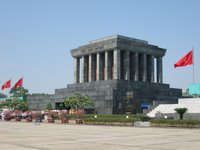
Yup, understated and subtle, that's exactly how I'd describe it too!
What is rather ironic about the place, is that in his will, Ho Chi Minh specifically requested that he be cremated. Not one to be deterred by the final wishes of their most beloved leader, the government instead decided to erect an enormous, grey structure, an edifice dedicated to ..."austerity, plainness, communism and humility." I'm not sure what a three story high, solid granite and marble building and roughly 12 acres of surrounding land, all to serve as a shrine to a single, annually re-embalmed body says about "humility and austerity" but it was interesting nonetheless. As you enter (and when I say "you" I mean me and about 1000 Vietnamese schoolchildren, I was the only white guy that I saw the whole time), you are passed through three different security checkpoints, where things such as car keys, pens and pins on hats are summarily removed by stern-faced guards. You then get into a line. This line stretches on and on and as they are apparently used to the crowds, there is a little canopy that runs over the length of the line. After about 20 minutes, the line moves enough so that you can get into the mauseoleum proper. Then the real security begins. Vietnamese soldiers, dressed in that particular shade of green that defies my ability to describe it except to say that it is a violent, frightening green, line the walls, one every 10 feet or so. Each has a gun on his hip and a very firm stare. As you pass, your pockets are stared at, your hands are watched, and should you falter or even pause, a voice reminds you to keep moving, sometimes with the assistance of a little push. A man in front of me (Vietnamese) had 5 separate guards stop him on the way up, as they had noticed a very slight bulge in his front pocket. This turned out to be a pacifier for the baby in his arms.
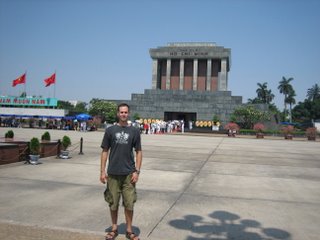
There is no way to take a non-awkward picture in this setting. For the record, this photo was snapped by a very accomodating soldier, who had to set down his rifle to take it.
Ol' Ho himself was quite a sight. He didn't look so much human as like a terrifying mannequin, albeit a very lifelike mannequin. There were probably 15 to 20 guards in this room, and during the 45 seconds of time in which I was herded through, not one of them moved a muscle. You can't stop to look, and you certainly can't take a picture as your camera was appropriated long ago. It was a very strange experience, looking into the dead face of a man whose picture hangs in nearly every home and business in the whole of the country. The rumor is that they re-embalm him every year, and that eventually there just won't be anything left to work with.
Morbidity aside, it was quite amazing to see how much this man is still revered by his country-people. They love him. It would take a truly brave soul to speak out against any thing that the man ever did, be it run over a frog on his bike or spitting in public. To the Vietnamese, the guy can do no wrong (well, in the North at least).
Hanoi also boasts quite a night life, with a profusion of establishments serving "Bia Hoi." Bia Hoi, for lack of a better description, is disgusting. It tastes like what beer would taste like if you gave a home brewing kit to someone who has never had a beer and told them to get to work. The catch is, it costs 2000 dong per glass. In Vietnam, 1 US dollar is equal to 16,000 dong. Thus, 8 beers for a dollar.
8 beers. One dollar. Shocking idn't it?
Given the above description, why would anyone subject themselves to this nonsense? Well, the price is certainly enticing, though you're probably overpaying for what you get, however the setting in which Bia Hoi is served is its main selling point. As previously described, people sit out on corners nearly 24 hours a day, on small chairs and around small tables. Thus, at every intersection, an elderly couple (not sure why this is, but thats the case) is serving Bia Hoi in dirty glasses to dozens of people sitting on the curbs. Since there are four curbs, four mini-bar areas, there are tons of people and a big, convival festival atmostphere about it. Vendors circulate among the crowds, selling lighters, pastries, amazing reproductions of Lonely Planet books and, of course, the ever present drugs. A typical interaction goes something like this:
"Lighter? Lighter"
"No."
"(much quieter voice) Something? Maree-wanaa? Oopium?"
"No, really thanks."
"(mutter somthing nasty in Vietnamese and walk to the next table)"
I met a number of excellent ex-pats, and with them, was able to explore some of the...ummm...stranger places around the city. After 7 days, it was time to move on, but this bizarre city and it's pre-war/post-war, old world/new world split personalities will carry on for me as one of my favorite places to visit.
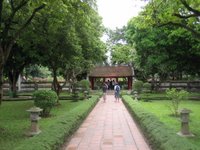
Special bonus picture: The Temple of Literature. Very cool.
Next: The mysteries of Halong Bay, a return to the Mountains, and some reflections on being an American in a place where that isn't something that you advertise.

